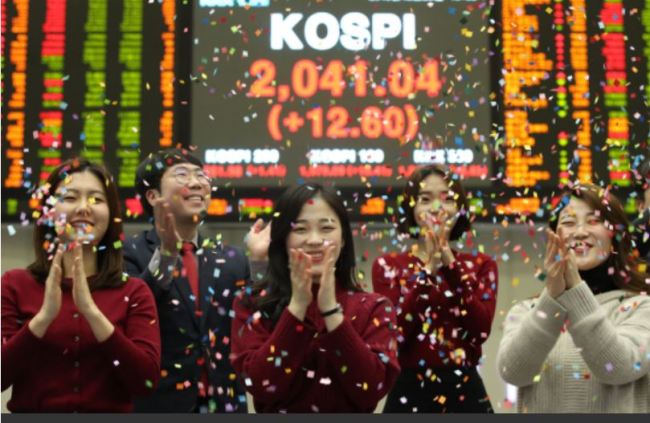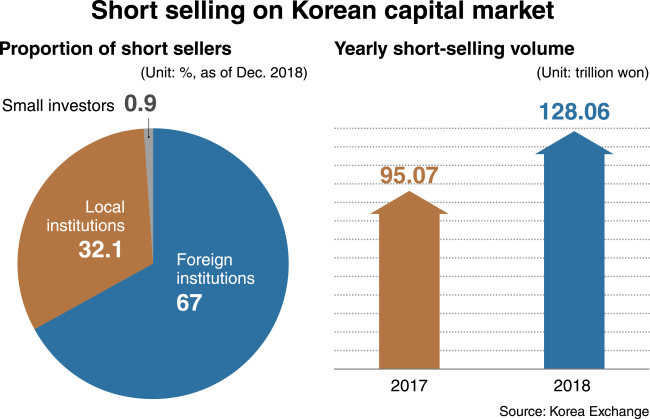[News Focus] Stock short-selling surges while ‘abolishment’ petitions grow
By Kim Yon-sePublished : Jan. 2, 2019 - 15:12
SEJONG - South Korea’s small individuals have continued to express their discontent with a systematic practice on the local stock market in which foreign and domestic institutions take huge gains via the short-selling skill.
Short selling is a legitimate trading skill. Generally, institutions can reap gains by dumping borrowed stocks and repurchasing them at far lower prices later, which is dubbed short covering. After making these gains, the institutions hand back the shares to the original holders, such as public pensions, brokerage firms and individuals.
From the trading skill, a large portion of retail investors in particular had to suffer huge losses despite financial soundness and decent earnings performance of their-holding listed company stocks. Short sellers have frequently targeted stocks whose proportion of individual stake were sharply rising.
Some rule perpetrators were found to have conducted “naked” short selling, under which investors sell stocks without borrowing. The practice is illegal in Korea’s capital market.
The sort of long-standing anger among the estimated 6 million local retail investors lies in the fact that financial authorities have taken a passive position amid growing voices to abolish short sales. They say the practice is totally unfair in Korea.
Short selling is a legitimate trading skill. Generally, institutions can reap gains by dumping borrowed stocks and repurchasing them at far lower prices later, which is dubbed short covering. After making these gains, the institutions hand back the shares to the original holders, such as public pensions, brokerage firms and individuals.
From the trading skill, a large portion of retail investors in particular had to suffer huge losses despite financial soundness and decent earnings performance of their-holding listed company stocks. Short sellers have frequently targeted stocks whose proportion of individual stake were sharply rising.
Some rule perpetrators were found to have conducted “naked” short selling, under which investors sell stocks without borrowing. The practice is illegal in Korea’s capital market.
The sort of long-standing anger among the estimated 6 million local retail investors lies in the fact that financial authorities have taken a passive position amid growing voices to abolish short sales. They say the practice is totally unfair in Korea.

Though the Financial Services Commission has provided individuals with rights to sell borrowed stocks as short selling, their rights are still restricted and borrowing process is complicated, compared to the wide rights held by local and foreign corporate investors.
While individuals are entitled to borrow stocks from only securities firms for the short sale, securities firms have not obligation of lending their stocks to the small investors. It is up to choice of each brokerages.
Individuals have called for financial authorities to answer their discontent and petitions in a reasonable manner through official statements, including an explanation of why regulatory officials does not think the rule is unduly unfair.
The majority of small investors appear to be demanding full-fledged abolishment of short selling by anyone, according to major online bulletin boards. They argue that the “limited” lifting the ban on individual short position is of no use.
The leader of an online community, composed of some 100 small investors in Seoul, said the FSC and Finance Ministry should make public their logic in terms of comparison between the local rules with global standards.
He said the government should explain the difference between the Korean system and that of the US, whose Securities and Exchange Commission allows individuals to exercise short sales rights on an almost “equal basis.” He added, “If any revised rules are unfair, there is no justification for existence.”
Likewise, in Japan, small investors investing in the Nikkei equities are given authority to borrow stocks from various institutions like pension funds, not just from brokerage firms, under the guidance of the Financial Services Agency of the country.
While the ratio of individuals’ short selling hovers around 10 percent in Japan, the percentage of Korean small investors stood under 1 percent as of December 2018 amid little efficacy and restricted permission.
A research analyst criticized, on condition of anonymity, some local institutions’ argument that short selling has a positive function in terms of providing sufficient liquidity to the market. “If their claim is logical, there is no reason to still issue a ban (despite partial lifting) on only individuals.”
He cited recently growing petitions to Cheong Wa Dae that call for the full-scale abolishment of the authority held by inbound institutions, local institutions and individuals.

The first-tier Kospi and secondary Kosdaq saw the short sales practice come to 128.06 trillion won ($114.24 billion) collectively in 2018, up 32.99 trillion won, or 34.7 percent, from the previous year.
Foreign investors accounted for 67 percent of short-selling volume last year, followed by local institutions at 32.1 percent and individuals with just 0.9 percent.
In 2018, six out of the top 10 stocks actively net-purchased by individuals posted “minus” gains. Some analysts and the majority of individuals allege that Samsung Electronics, of which many shares were bought by retail investors and sold by foreigners, is one of the main targets of powerful short sellers.
By Kim Yon-se (kys@heraldcorp.com)






![[From the Scene] Monks, Buddhists hail return of remains of Buddhas](http://res.heraldm.com/phpwas/restmb_idxmake.php?idx=644&simg=/content/image/2024/04/19/20240419050617_0.jpg&u=20240419175937)





![[Graphic News] French bulldog most popular breed in US, Maltese most popular in Korea](http://res.heraldm.com/phpwas/restmb_idxmake.php?idx=644&simg=/content/image/2024/04/18/20240418050864_0.gif&u=)


![[From the Scene] Monks, Buddhists hail return of remains of Buddhas](http://res.heraldm.com/phpwas/restmb_idxmake.php?idx=652&simg=/content/image/2024/04/19/20240419050617_0.jpg&u=20240419175937)

![[KH Explains] Hyundai's full hybrid edge to pay off amid slow transition to pure EVs](http://res.heraldm.com/phpwas/restmb_idxmake.php?idx=652&simg=/content/image/2024/04/18/20240418050645_0.jpg&u=20240419100350)

![[Today’s K-pop] Illit drops debut single remix](http://res.heraldm.com/phpwas/restmb_idxmake.php?idx=642&simg=/content/image/2024/04/19/20240419050612_0.jpg&u=)